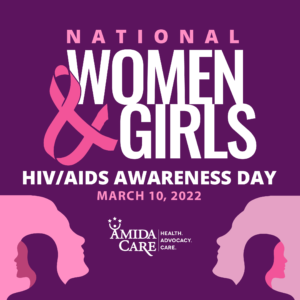National Women & Girls HIV/AIDS Awareness Day: Bringing the Epidemic Out of the Shadows

Did you know?
- One in four people living with HIV in the U.S. is a woman, with the vast majority of transmissions occurring from sex with a male partner who has HIV.
- Women of color and transgender women experience disproportionately high rates of HIV transmission and low rates of testing and treatment, compared with other women.
- Only 7% of women who could benefit from pre-exposure prophylaxis (PrEP) were prescribed PrEP in in U.S. in 2018.
- HIV stigma is higher for women than for men.
(Statistics: Centers for Disease Control)
Thursday, March 10 is National Women and Girls HIV/AIDS Awareness Day, a day to raise awareness about the impact of HIV on women and show support for women and girls living with HIV.
Although men often represent the face of HIV, with men of color being the most affected population in the U.S., women – particularly women of color – are also deeply impacted. Women of color and women who are immigrants often face particular challenges that place them at elevated risk for HIV, including unstable housing and domestic violence.
What Can Be Done
There is a lot that women and girls can do to protect their health:
Get Tested.
Women placed at elevated risk of HIV should get tested often. Girls and women 12 and older can get free or low-cost tests at NYC Sexual Health Clinics, regardless of immigration status. To locate an HIV testing site in NYC, search the NYC Health Map, text “TESTNYC” to 877-877, or call 311.
Learn About PrEP and PEP to Prevent HIV.
PrEP (pre-exposure prophylaxis) is a pill that is over 90% effective in preventing HIV. Using PrEP is a powerful way to take control of your sexual health. Talk to your health care provider to find out if it is right for you.
PEP (post-exposure prophylaxis) is medicine taken to prevent HIV after a possible exposure.
Get Treatment.
Women living with HIV who receive treatment and become virally suppressed can live longer, healthier lives and cannot transmit HIV to others. It’s crucial that people living with HIV access treatment as soon as possible for treatment to be most effective. (Undetectable equals Untransmittable, U=U).
Women have been heavily impacted by HIV since its earliest days. We must bring the HIV epidemic among women out of the shadows, and provide supportive services that meet their needs as partners, mothers, caretakers, and friends. Ultimately, this will greatly improve the health of our community as a whole.
Additional Resources
National Women & Girls HIV/AIDS Awareness Day
U.S. Dept. of Health & Human Services Office on Women’s Health
